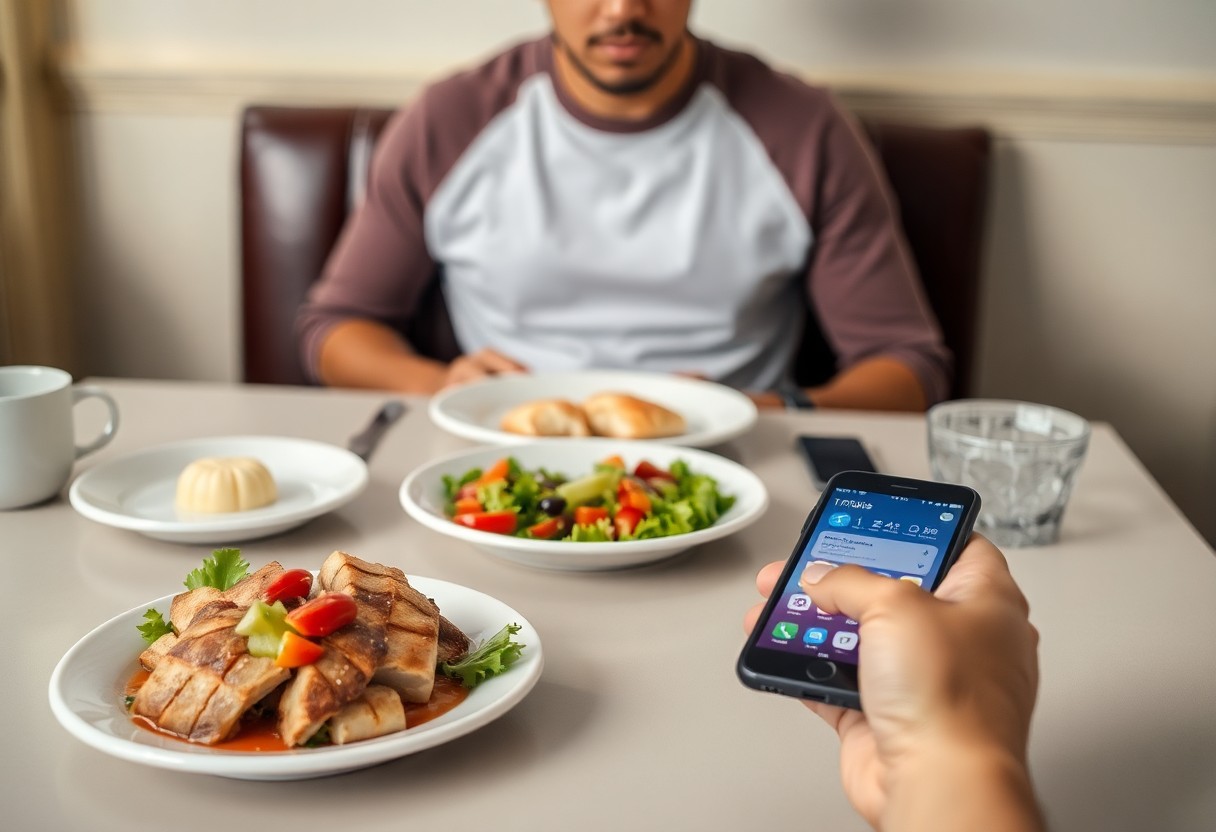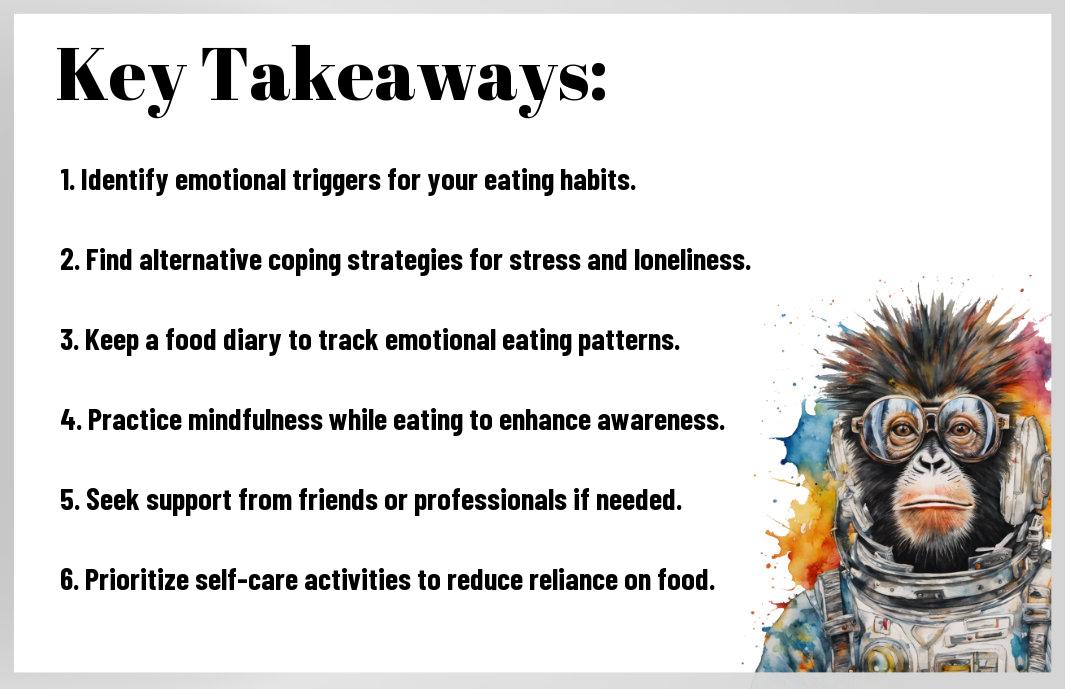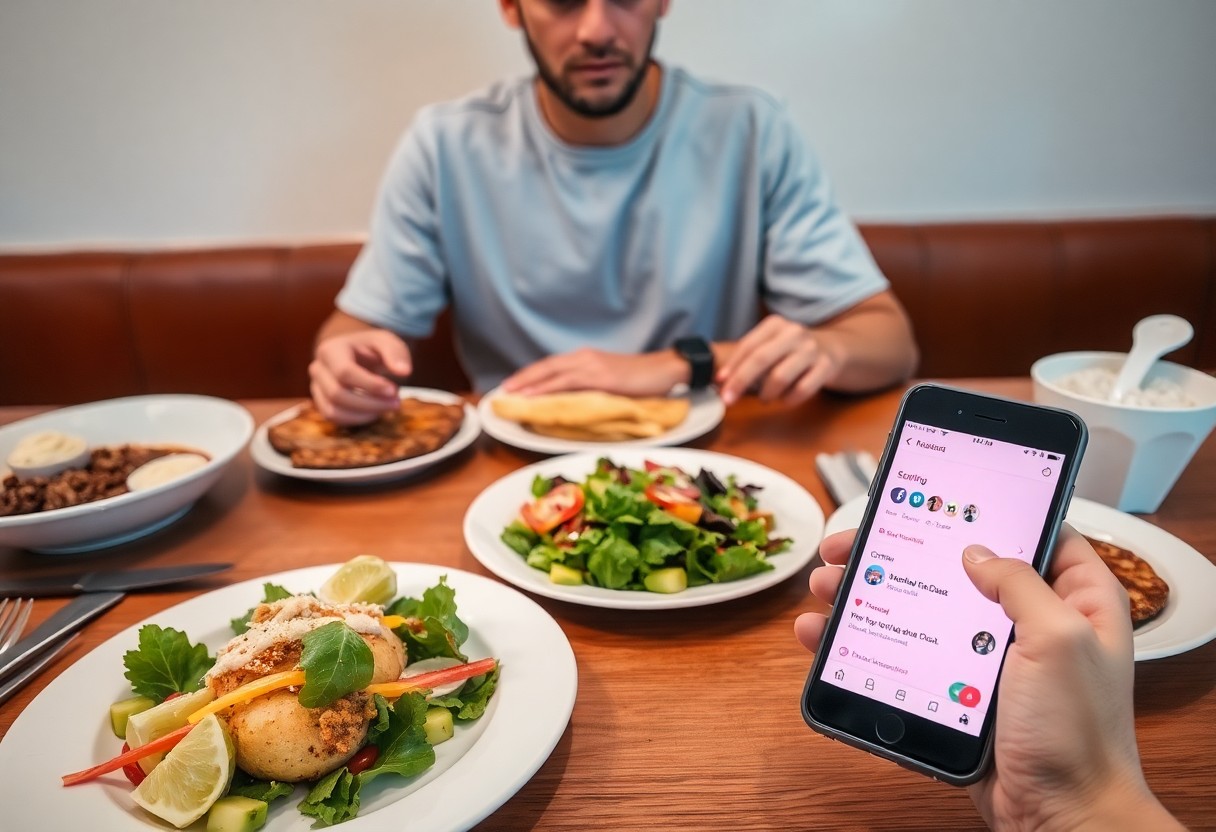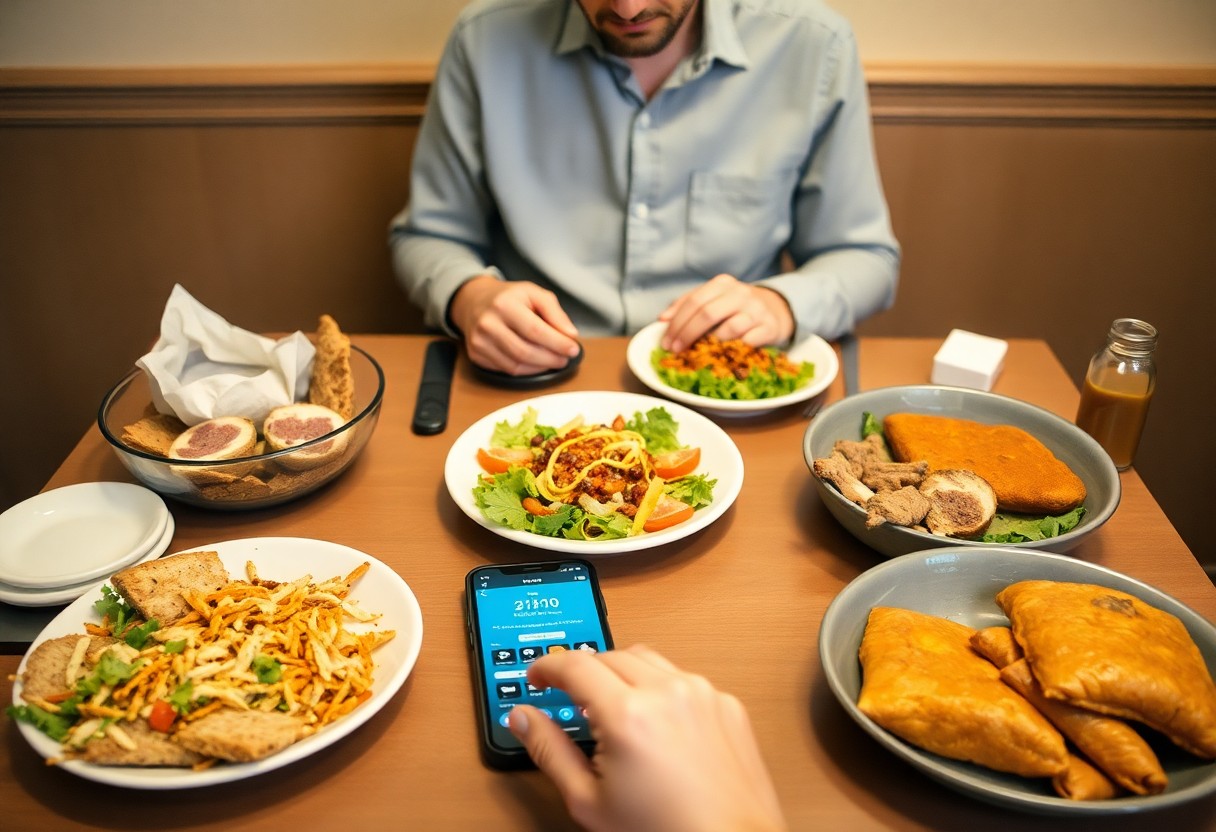Overeating can often be a response to the feelings of loneliness and stress that many of us face in our daily lives. I find myself occasionally turning to food not for hunger, but as a source of comfort and relief. However, this coping mechanism can lead to negative health outcomes, such as weight gain and emotional distress. In this blog post, I’ll explore the intricate relationship between your emotions and eating habits, and provide some insights on how to break this cycle for a healthier, more balanced life.

Key Takeaways:
- Emotional eating often stems from feelings of loneliness and stress, prompting individuals to seek comfort in food instead of addressing underlying issues.
- Identifying triggers for overeating can help in developing healthier coping strategies, such as engaging in social activities or practicing mindfulness.
- Building a support network and exploring alternative outlets for stress relief, such as exercise or hobbies, can reduce reliance on food for emotional comfort.
Understanding Loneliness
Your experience with loneliness is not just a fleeting emotion; it is a complex psychological state that can significantly impact your overall well-being. It’s important to understand that loneliness isn’t merely the absence of social connections, but a feeling of disconnection even when surrounded by people. This emotional state can arise from various factors, including life transitions, relationship breakdowns, or even personal insecurities. Recognizing the multifaceted nature of loneliness is the first step toward addressing it effectively and finding healthier coping mechanisms.
The Psychology of Loneliness
Behind the feeling of loneliness often lies a deeper psychological struggle. I’ve noticed that this emotion can trigger a cycle of negative thoughts, including feelings of inadequacy or low self-worth. You might tell yourself that you’re not good enough or that no one cares about you. Such beliefs can perpetuate feelings of isolation, reinforcing your loneliness. In this state, it’s easy to feel trapped in a cycle of despair, making it important to understand the underlying psychology that fuels these emotions.
How Loneliness Affects Eating Habits
Above all, loneliness can have a profound impact on your eating habits. When I feel lonely, I often find myself seeking comfort in food, using it as a temporary escape from emotional pain. This can lead to overeating or making poor dietary choices, such as opting for unhealthy snacks or indulging in excessive amounts of food. The act of eating can provide a momentary sense of relief, which only serves to reinforce this harmful coping mechanism. It’s important to realize that these actions do not address the root cause of loneliness and can ultimately lead to negative health outcomes.
Understanding how loneliness affects your eating habits is vital for your overall health. When you use food as a coping mechanism, you may end up in a vicious cycle of temporary satisfaction followed by guilt or discomfort. Those moments of emotional eating may feel like a solution, but they often lead to long-term consequences such as weight gain and increased feelings of loneliness. Instead, acknowledging your emotions and finding alternative ways to cope can be more beneficial for your mental and emotional well-being.

The Relationship Between Stress and Eating
If you’ve ever found yourself reaching for snacks during particularly stressful times, you’re not alone. Stress is a significant factor that can influence our eating habits, often leading to overeating or unhealthy food choices. When you’re under pressure, whether from work, personal relationships, or other factors, your body produces higher levels of the hormone cortisol. This hormone can trigger a strong desire for high-calorie foods, as your body seeks comfort and relief from the stress you’re experiencing. The instinctual response may be to reach for sugary treats or fatty foods, which can temporarily boost your mood but ultimately contribute to a cycle of overeating and guilt.
Stress-Induced Cravings
Above all, understanding how stress-induced cravings operate is vital. When stress levels rise, the brain can misinterpret the need for solutions to emotional discomfort as a need for food. This response can lead to cravings that aren’t necessarily linked to physical hunger; instead, they are more about coping with feelings of anxiety or sadness. It is not just about satisfying hunger but about seeking instant relief from discomfort. You might find yourself craving highly palatable foods that provide a quick fix, which often leads to consuming more than your body requires.
Emotional Eating and Its Triggers
Along my journey, I have learned that emotional eating is often connected to specific triggers—such as feeling lonely, overwhelmed, or even bored. It can be easy to snack mindlessly while experiencing these emotions, as food can serve as a temporary distraction. I often catch myself using food as a way to fill an emotional void, seeking comfort through eating rather than addressing the underlying emotions. This behavior sets the stage for a cycle where you may feel guilt or shame afterward, yet turn back to food for solace the next time you feel stressed or lonely.
Eating as a response to emotional triggers can lead to a disconnected relationship with food. You might notice that you turn to comfort foods whenever you feel overwhelmed, suggesting that the root of your cravings is not physical hunger but rather a need for emotional relief. By identifying your specific triggers and realizing when you’re eating emotionally, you can create opportunities for healthier coping strategies. Strategies such as practicing mindfulness, engaging in physical activity, or journaling can help process feelings without relying on food as a source of comfort. Recognizing these patterns can empower you to make more conscious choices about how you handle stress, ultimately leading to a better relationship with food.

Identifying Overeating Patterns
Many people struggle with recognizing their eating behaviors, especially when it comes to emotional eating. If you find yourself reaching for that extra slice of cake after a long day, it’s imperative to reflect on why you might be doing so. The Association of Emotional Eating with Overweight … suggests that emotional triggers often lead to overeating. Becoming aware of these patterns can be the first step towards managing your relationship with food, instead of allowing it to manage you.
Signs of Emotional Overeating
Among the most common signs of emotional overeating are eating when you are not physically hungry and eating to relieve stress, anxiety, or boredom. You may find yourself using food as a reward or comfort after a challenging day, often going beyond what your body actually needs. If you notice these behaviors frequently, it’s a telltale sign that you might be using food as a coping mechanism for your emotions.
Keeping a Food Diary
Along this journey of self-discovery, keeping a food diary can be an invaluable tool to help you identify your eating triggers. By jotting down what you eat, when you eat, and how you feel at that moment, you can observe patterns that may reveal connections between your emotions and eating habits. This practice allows for greater awareness of your choices and can help shift your focus from eating automatically to eating mindfully.
The process of maintaining a food diary doesn’t have to be tedious. You can break it down into simple entries, noting down your meals and snacking moments along with your emotions at the time. This practice can highlight dangerous patterns in your eating behaviors, such as eating in response to feelings of stress or loneliness. It can also bring attention to positive changes when you replace snacking with healthier coping strategies like exercise or meditation, ultimately leading to an improved relationship with food. By committing to this practice, you empower yourself to make informed decisions about your eating habits and promote a healthier lifestyle.
Strategies for Healthy Coping Mechanisms
Once again, it’s crucial to identify healthier ways to cope with loneliness and stress, rather than turning to food as a source of comfort. Finding effective coping mechanisms can lead to profound improvements in both your mental and physical well-being. Implementing structured strategies in your daily routine can help redirect your focus and energy, fostering a healthier relationship with food and a more balanced emotional state.
Mindfulness and Meditation
One powerful tool that I have found beneficial is the practice of mindfulness and meditation. These techniques can help you tune in to your thoughts and emotions without judgment, allowing you to observe your cravings and feelings of loneliness with greater clarity. By incorporating just a few minutes of mindfulness into my daily routine, I’ve been able to reduce feelings of stress and stay grounded in the present moment, which can help combat the urge to eat in response to emotional triggers.
One effective mindfulness exercise involves focusing on your breath, noticing each inhalation and exhalation. This practice can create a calming effect and enable you to acknowledge your feelings without necessarily reacting to them through overeating. As you become more adept at recognizing and processing your emotions, you may find it easier to manage stress without turning to food for comfort.
Building Stronger Social Connections
One of the key strategies for managing loneliness and stress is building stronger social connections. Establishing and nurturing relationships can provide you with the emotional support needed to help you cope with life’s challenges. Engaging with friends, family, or community groups allows you to share your thoughts and feelings, creating an crucial support network that can mitigate feelings of isolation.
Considering the importance of strong social ties in your life, make it a priority to reach out and engage with others regularly. Participating in group activities, volunteering, or simply scheduling phone calls or video chats with loved ones can foster deeper connections and provide a sense of belonging. When you feel supported and connected, it’s much easier to manage stress effectively, ultimately reducing the likelihood of using food as a coping mechanism.
Nutritional Choices to Combat Stress
Now that we’ve identified the challenge of using food to cope with loneliness and stress, it’s vital to explore nutritional choices that can help manage these feelings without resorting to overeating. Incorporating a variety of nutrient-dense foods into your diet can not only enhance your physical health but also improve your mental well-being. By focusing on wholesome options, you can better equip yourself to tackle stressors all while enjoying the benefits of a balanced diet.
Foods that Boost Mood
Before I examine specific foods that can help elevate your mood, it’s important to understand the connection between our diet and emotional state. Certain foods can positively influence neurotransmitter activity in the brain, enhancing feelings of happiness and reducing anxiety. For instance, including foods rich in omega-3 fatty acids, such as salmon and walnuts, can improve brain function and reduce depressive symptoms. Additionally, incorporating whole grains that release serotonin, a neurotransmitter linked to mood regulation, can help you maintain a stable mood throughout the day.
Developing a Balanced Eating Plan
An effective strategy for managing stress and preventing overeating is to develop a balanced eating plan that suits your lifestyle and preferences. For instance, focusing on a variety of whole foods, such as fruits, vegetables, lean proteins, and healthy fats, creates a nourishing foundation. This balanced approach not only ensures that you are obtaining important nutrients but also helps you feel more satisfied and less likely to reach for unhealthy snacks in moments of stress.
Eating balanced meals at regular intervals can truly make a difference in how you feel. It’s important to prioritize protein and fiber in your meals, as they promote satiety and can stave off cravings. Additionally, I recommend staying hydrated by drinking enough water throughout the day; even mild dehydration can exacerbate feelings of fatigue and irritability. By planning your meals ahead of time and keeping wholesome snacks handy, you create an environment that supports emotional resilience and reduces the temptation to use food as a coping mechanism during stressful times.
When to Seek Professional Help
Recognizing When You Need Support
Beside the physical aspects of overeating and unhealthy eating habits, I often find that emotional factors play a significant role. If you notice that your eating patterns are increasingly linked to your feelings of loneliness or stress, it may be time to take a step back and evaluate your relationship with food. Are you using food as a means to fill an emotional void or cope with overwhelming feelings? If your eating habits are causing you distress, affecting your physical health, or leading to an unhealthy relationship with food, seeking professional support can be immensely beneficial. The decision to seek help is a positive step toward understanding and addressing the underlying issues, rather than just focusing on the eating behaviors themselves.
Options for Therapy and Counseling
To address emotional eating and its underlying causes, there are various therapeutic options available that can work in conjunction with your personal journey. Therapy can offer a safe space for you to explore your emotions and develop healthier coping mechanisms. Cognitive Behavioral Therapy (CBT) has proven effective in addressing anxiety and depressive symptoms that may contribute to overeating. You might also consider individual therapy, group counseling sessions, or support groups focused on emotional eating and body image issues. Engaging with a professional can help you build a strong foundation to manage stress and loneliness in healthier ways.
It can be incredibly empowering to explore different therapy modalities, whether it be through mindfulness practices, nutrition counseling, or support groups. Many professionals focus on the psychological aspects of eating and can provide you with tools to recognize patterns that lead to overeating. Working with a therapist can help you develop a personal strategy to address these challenges, ensuring that you can foster a healthier relationship with food. Ultimately, seeking help can lead to greater self-awareness, better emotional regulation, and a lifestyle that promotes your overall well-being.
Conclusion
So, if you find yourself using food as a way to cope with feelings of loneliness or stress, it’s important to take a step back and evaluate how that might be impacting your overall well-being. I encourage you to consider healthier alternatives for managing these emotions—whether it’s engaging in a hobby, reaching out to a friend, or even practicing mindfulness techniques. These strategies can provide the emotional support and comfort you may be seeking without turning to food as a crutch. Your journey toward a healthier relationship with food starts with awareness and intention.
It’s natural to experience ups and downs in life, and I understand how easy it is to let isolation and stress lead to overeating. The key is to build awareness around your triggers and explore new coping mechanisms that genuinely nourish your body and soul. By prioritizing your mental health and finding new ways to connect with yourself and others, you can break the cycle of emotional eating and pave the way for a more balanced and fulfilling lifestyle. Your journey is unique, so take it one step at a time, and be gentle with yourself along the way.
FAQ
Q: How can I identify if I’m using food to cope with loneliness and stress?
A: One way to identify if you are using food as a coping mechanism is to reflect on your eating patterns. Notice if you tend to eat when you are feeling lonely, anxious, or stressed rather than when you are hungry. Keep a food diary to record not just what you eat, but also your emotions surrounding those meals. This self-awareness can help you understand if your eating habits are linked to emotional triggers.
Q: What are some healthier alternatives to using food for emotional comfort?
A: Instead of turning to food, consider engaging in activities that promote emotional well-being. This could include exercising, practicing mindfulness or meditation, spending time with friends or family, journaling, or exploring creative hobbies. Finding activities that you enjoy can help you cope with stress and loneliness without relying on food for comfort.
Q: How can I manage my cravings when I feel lonely or stressed?
A: Managing cravings during times of stress or loneliness can be approached by first acknowledging the feelings you’re experiencing. When a craving arises, give yourself a moment to pause and assess whether you’re truly hungry. If not, try drinking water or herbal tea, which can distract from cravings. Additionally, engaging in a short physical activity or mindfulness exercise can help redirect your focus away from eating.
Q: Is it normal to feel guilty after overeating during stressful times?
A: It’s common to feel guilt or shame after overeating, especially if you realize that food is being used to cope with emotions. It’s important to be gentle with yourself; we all have moments of emotional eating. Instead of dwelling on guilt, reflect on what you can learn from the experience and identify healthier coping strategies for the future.
Q: How can I create a supportive environment to reduce emotional eating habits?
A: To create a supportive environment, begin by clearing out unhealthy snack options and replacing them with nutritious foods. Establish structured meal times to foster mindful eating practices. Surround yourself with supportive friends or family who understand your goals. Lastly, consider involving them in activities that divert attention from food while enhancing social interaction, such as group workouts or cooking healthy meals together.





0 Comments